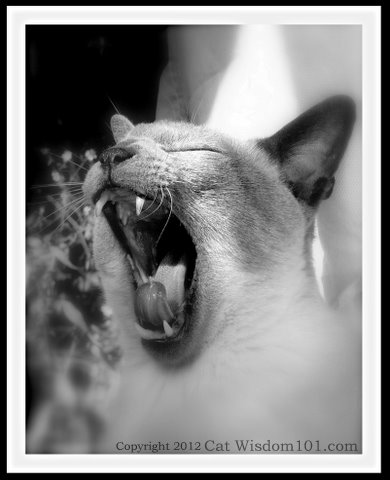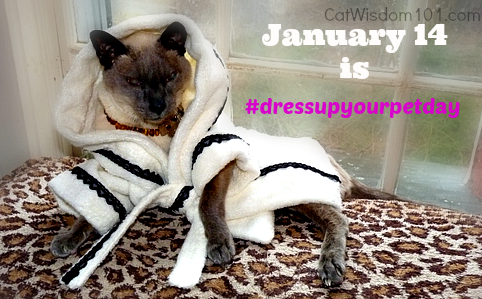How to Keep Your Cat’s Teeth Healthy
Vet 101 will return next week. We’re delighted to have veterinarian Dr. Lorie Huston guest post for us. I met Lorie at the Cat Writers’ Association conference back in November and instantly liked her down to earth passion for cats. She currently practices at a busy urban veterinary hospital in Providence, Rhode Island, where she has been employed since 1988.
Lorie has been writing online since 2001, when she first published The Pet Med Site. Currently, you can find her at her blog, the Pet Health Care Gazette
Dental Health Care for Your Cat
February is National Pet Dental Health Month, but every month is important for your cat’s dental health. Make no mistake; your cat does need proper dental care. Without it, he could suffer pain from bad teeth and other dental diseases as well as being at risk for even more serious illnesses, like heart and kidney disease.
Adequate dental care for your cat depends on both home care and veterinary care. At home, brushing your cat’s teeth is the gold standard in dental care.
With patience, training and practice, most cats can be taught to tolerate having their teeth brushed. Training your cat as a kitten is helpful but older cats can be taught as well. Start slowly, moving one step at a time and allowing your cat to adjust before moving on to the next step. Start by simply using gauze on your fingertip to rub your cat’s teeth and gums. Then move on to the toothbrush, at first merely placing the brush against the teeth. Once you can place the brush on your cat’s teeth without reaction, start moving the brush in a circular motion. The last step is introducing the toothpaste. Use only toothpaste designed for cats.
For cats that will not accept having their teeth brushed, other alternatives are available. These include dental chews like Greenies for Cats. Foods formulated for dental control can be helpful to some extent as well. However, these alternatives are not likely to be as effective as brushing and may necessitate more frequent veterinary dental examinations and cleanings.
During the course of your cat’s regular examinations, your veterinarian will perform a cursory exam of your cat’s mouth. However, veterinary dental care for your cat will involve anesthesia. Without anesthesia, your veterinarian will be unable to adequately examine your cat’s teeth.
There are several steps to a thorough oral examination. First your veterinarian will examine each individual tooth as well as the other structures in your cat’s mouth looking for evidence of dental disease and other abnormalities in your cat’s mouth. Radiographs (x-rays) of your cat’s mouth may be necessary as well as part of the oral exam.
Next, your veterinarian will clean your cat’s teeth. This cleaning must be done while your cat is anesthetized as well. A special ultrasonic dental cleaning device is used to remove the tartar and plaque not only from the visible surfaces of your cat’s teeth but also from under the gumline, which is where dental disease starts.
Finally, your veterinarian will develop a plan to treat and/or control any disease found in your cat’s mouth. Treatments may range from more vigilant at-home care to root canals or even extraction of diseased teeth, depending on the condition of your cat’s mouth.
Proper dental care is an absolute necessity for any cat and will insure a pain-free and healthier life for your cat.





9 Comments
Healing Paws
Brushing teeth is definitely the ideal, but you’re right that it can be hard to implement with cats. Better than greenies, though, which are full of sugar, is a wholesome, low-sugar diet. Many people think wet food isn’t as good for teeth, but a grain free, high protein, low carb food is much healthier for teeth than kibbles that are full of grains and colorants!
Dental implants in Encino
When we talk about dental health even the animals, like cats, do need some special care. So we must care for our loving pets, especially for their teeth.
lorrie culver
Unhealthy teeth & gums have greater impact on the body than just causing bad breath, pain & infection. Poor dental care will cause gingivitis & left untreated, gingivitis can progress to periodontitis. Infection and inflammation spreads from the gums (gingiva) to the ligaments and bone that support the teeth.
Rich Brown
Hmmm, I might have to try the gauze trick with my cat – he HATES to have his teeth brushed – maybe I just went all in too soon! I read an article on this dental water for dogs recently that apparently removes plaque over a few months. Wonder if they’ll bring in the same for cats at some point?
Tamika
Greetings! This is my first comment here so I just wanted to give a quick shout out and say I really enjoy reading through your articles. Can you recommend any other blogs/websites/forums that cover the same subjects? Thanks for your time!
Deb Barnes - Zee and Zoey
Very good guest post Lorie – thank you for sharing this information. I like the idea of starting slow with guaze on the fingers.
Marilia
UAU!!!! What a big mouth. Thanks to share this important post.
Brian
Geezt advice from a very wise human, thanks!
CATachresis
Thank you for this post. Very helpful.